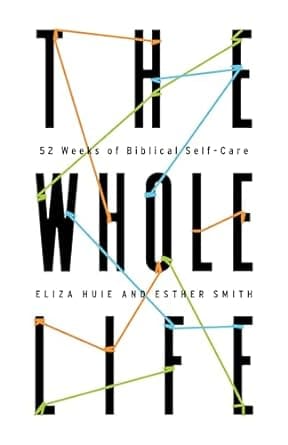
What Is Biblical Self-Care?
This excerpt explores the question, “what is biblical self-care,” and shows how caring for ourselves is not selfish, but scriptural. By examining God’s Word, the piece highlights how caring for our physical, emotional, and spiritual well-being equips us to love others better and glorify God. It’s a thoughtful guide for believers seeking to honor God through whole-life stewardship.
Take care of your body as if you were going to live forever; and take care of your soul as if you were going to die tomorrow. Augustine
Embracing the idea of self-care can feel uncomfortable. The word isn’t found in Scripture, and some Christians may wonder if self-care is contrary to a sacrificial life. Doesn’t the Bible call us to put the care of others first? Won’t attending to self-care lead to selfishness? These common questions and concerns often arise when we don’t consider a biblical understanding of the principles behind self-care.
Self-care is an extra-biblical word that contains essential biblical truth. We define biblical self-care as the practice of drawing on divinely given resources to steward our whole lives for personal enrichment, the good of others, and the glory of God. We don’t practice self-care because it’s trendy. We practice self-care because it’s a biblical concept. We embrace self-care as a way to steward our souls, minds, bodies, and relationships. This whole-life stewardship is an act of obedience to God’s call to love others as we love ourselves. The following concepts explain biblical self-care as seen in Scripture.
Biblical Self-Care Is Stewardship. We are called to steward everything God gives us. A steward manages and cares for resources. This stewardship principle goes beyond financial and material resources. We are to be good stewards of God’s varied graces, including ourselves (Luke 12:48; 2 Corinthians 9:6–15; 1 Peter 4:10). God gave us bodies that need care. He gave us souls that need attention. Scripture affirms the reality of human needs and does not discourage meeting those needs. Numerous places in the Bible describe, even encourage, paying appropriate attention to caring for ourselves (1 Kings 19:1–8; Matthew 15:32; Mark 6:31– 32; Acts 20:28; Ephesians 5:29).
Biblical Self-Care Is Modeled by Jesus. Jesus is God in human flesh. In Scripture we see him give attention to his human needs. When he was hungry, he ate. When he was tired, he rested. When he needed time alone with the Father, he made this a priority. As the perfect man, his whole life was perfectly balanced. Not only did he model stewardship of his body, mind, soul, and relationships, he also encouraged others to do the same (Mark 1:35; 11:12; 12:31; John 4:6).

Biblical Self-Care Is Rooted in Creation. We see this most clearly in the institution of the Sabbath in Genesis 2:1–3. Rest is part of our original created design and a key component of biblical self-care. From the beginning of time, God’s divine intention was that we stop and pause from the demands of life and work. While rest refreshes our bodies, minds, souls, and relationships, it’s also a proclamation of trust. We rest as an act of trust-filled worship, declaring God as our creator and sustainer. God intended these pauses to reaffirm in our hearts that he will supply all that we need as we obey the command to rest (Exodus 20:8–11; Philippians 4:19).
Biblical Self-Care Is a Blessing to Others. Scripture teaches that we are to love one another (Romans 12:10) and do good to everyone (Galatians 6:10). As we give Christlike attention to our own needs, we are equipped to show Christlike love for others in need. God enriches us in every way so we can be generous in every way (2 Corinthians 9:11). Wisely caring for ourselves according to God’s Word enables us to effectively pour ourselves into the lives of others.
Biblical Self-Care Is Tied to the Gospel. As we have just seen, self-care is important because it helps us to love others well. Our love for others is motivated by the gospel. We love others because Jesus first loved us (1 John 4:7–11). The most important way we love others is by sharing with them the good news of what Jesus has done. Our ability to do this is tied to how well we care for ourselves. We fulfill the Great Commission in our bodies, with our minds, through our relationships, and as an outpouring of what Jesus has done for our own souls (Matthew 28:18-20; 2 Corinthians 5:18–21).
These concepts support self-care as an important priority for Christians. Sadly, believers are often left feeling guilty or ashamed for embracing practices of self-care. Taking time away for refreshment or spending money for things that encourage physical or emotional wellness are often seen as frivolous or selfish. Taking needed breaks from the demands of life to take a nap, read a good book, or take a walk are met with disapproval when progress is halted. In certain seasons of life, it may be more difficult to figure out how to practice self-care in a way that is biblical. We will address this more in Week 44 and Week 51. However, regardless of circumstances, believers should not be shamed when attending to their needs but rather encouraged to care for themselves.
Have these biblical truths challenged your perspective? This week you will assess your personal views on self-care and consider how God might be inviting you to change your approach to caring for yourself. To get the most out of the action and application sections we encourage you to engage each question prayerfully and attentively.
Gospel Spotlight
As important as self-care may be, it’s not our most pressing need. What we need most is Jesus. In him we lack nothing (Psalm 23:1). He is the source of our physical, spiritual, emotional, and relational health. We have nothing to offer others that we have not received from him (John 15:1–27).
Action and Application
Spiritual: What message have you received from Christian teachers or other believers about self-care? How has that impacted your understanding of God’s view of caring for yourself?
Emotional: What emotions come up when you think about practicing self-care? How do those emotions align with the concepts of biblical self-care stated above?
Physical: Scripture teaches that our bodies are temples of the Holy Spirit (1 Corinthians 6:19). Our bodies are to be used to bring God glory. How well do you take care of your body?
Relational: Have you experienced pushback in your relationships when you take time to care for yourself? Think about how you can address this tension biblically. Use the Scriptures from this week’s reading to help you.
Guided Journaling
How well are you caring for yourself? On a scale of one to ten, give yourself a rating on how you are doing. One equals little to no self-care. Ten equals self-care is a regular part of your routine. Jot down your number. As you think about your rating, what changes do you feel compelled to make?
…
Explore more biblical wisdom for living whole – in body, mind, and spirit.
Order your copy of The Whole Life: 52 Weeks of Biblical Self-Care by Eliza Huie and Esther Smith
Excerpted from The Whole Life: 52 Weeks of Biblical Self-Care © 2021 by Eliza Huie and Esther Smith. Used with permission of New Growth Press. May not be reproduced without prior written permission.
Trending Now
Sign up today for your Inspiration Today Daily Newsletter
Supercharge your faith and ignite your spirit. Find hope in God’s word. Receive your Inspiration Today newsletter now!
Eliza Huie
Eliza Huie is a biblically trained, professionally licensed counselor. She is the Director of Counseling at McLean Bible Church in Vienna, VA, and the Dean of Biblical Counseling at Metro Baltimore Seminary. She and her husband Ken have three grown children and a daughter-in-law. Learn more at elizahuie.com
Related Articles
January 28, 2026
I Just Knew It Was God: From Searching to Finding Faith
From the outside, Ekaterina’s life looked successful. She had a college degree, a strong career,…
January 26, 2026
How to Overcome Old Wounds with Resilience
How Do You Deal with Old Wounds? Everyone is talking about trauma, but very few are talking about…
November 21, 2025
Thank You … Lord
Gratitude transforms our lives and draws us closer to God. This article explores how practicing…
October 27, 2025
So, Is God Good?
Many people wrestle with the question, is God good, especially when life brings pain and loss.…
Next Steps To Strengthen Your Walk
Inspiration Today Newsletter
Supercharge your faith and ignite your spirit. Find hope in God’s word. Receive your Inspiration Today newsletter now!
Christian Articles
Find articles to strengthen your walk and grow your faith. We have a wide range of topics and authors for you.
Submit A Prayer Request
We are here for you. Simply click on the button below to reach us by form, email or phone. Together we will lift our hearts and voices with you in prayer.





